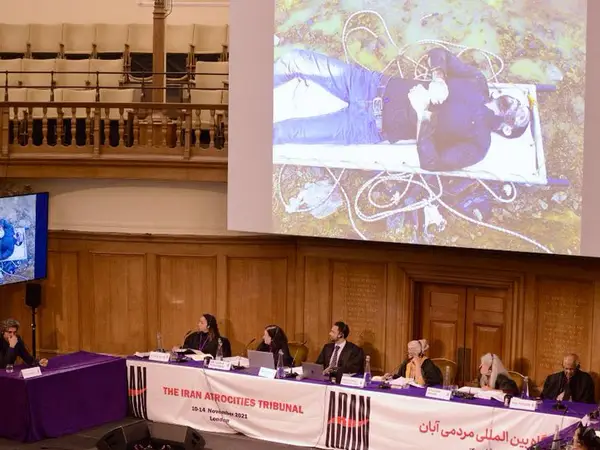In the third day of the Iran Atrocities Tribunal in London the brother of a victim who was killed by security forces in the November 2019 protests testified.
Two human rights experts who have followed the aftermath of the protests and have documented atrocities, as well as a doctor who was on duty during the protests testified.
Bahar Saba, a researcher from Amnesty International told the Tribunal that weapons used by security forces in the protests show that they intended to kill unarmed demonstrators.
The tribunal, organized by several human rights groups convened in London Wednesday to examine the atrocities and violence against protesters in Iran in November 2019. Iran declined an invitation from the organizers to take part.
Saba also told the panel of judges that security forces had fired tear gas into homes where children were present and fired pellet guns at underage people in the streets. A 16-year-old lost his eye as a result.
Shadi Sadr, a human rights expert and activist representing Justice for Iran, said that her organization had collected 2,298 videos of the protests showing violence and killing of demonstrators and onlookers in 86 cities and 29 provinces. After verifying the images, in 310 videos shooting was audible or dead bodies could be seen.
In the morning session, witness number 31, whose bother was shot dead by security forces, testified. He said that the military prosecutor at the time refused to name the officer responsible for his brother’s death but told him “We will deal with him.” Later, the family received information from the military court that security forces had fired 700 bullets at protesters, despite initial denials.
The witness, whose identity was disguised to protect his security in Iran, said that on the day of his brother’s burial, the police closed schools around the cemetery and took up position on the roofs, ready to open fire in case of any spontaneous protests.
A doctor, who testified from Iran and was tagged as witness 109, said that security agents were canvassing patients to identify any wounded protesters and were not allowing the hospital to admit any casualties from the protests.
The four-day Tribunal heard numerous testimonies or recorded videos from Iran. The organizers say that Iranian officials who ordered security forces to kill protesters should remain unpunished. They demand the United Nations forms an investigative committee to look into the violence that killed hundreds of unarmed protesters. Reuters reported in December 2019 that Supreme Leader Ali Khamenei had ordered to suppress the protests and up to 1,500 people were killed.
